Former KPWHRI Executive Director Eric B. Larson, MD, MPH, retires
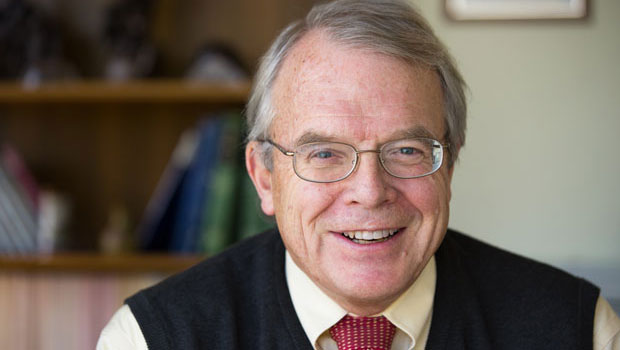
Read the ACT Study founder's message on putting enlightened aging into practice
Eric B. Larson, MD, MPH, served as executive director of Kaiser Permanente Washington Health Research Institute (KPWHRI) for nearly 18 years, from 2002 to 2019, moving from a position as Medical Director of the University of Washington Medical Center. From 2017 to 2019, Larson was also Kaiser Permanente Washington Vice President for Research and Health Care Innovation.
We celebrate Larson's retirement from KPWHRI this year by sharing his message to researchers and participants of the Adult Changes in Thought (ACT) Study. For more than 30 years, ACT has collected longitudinal data on nearly 6,000 Kaiser Permanente Washington participants. Among ACT's groundbreaking results are studies describing the types, frequencies, characteristics, and influencing factors of Alzheimer's disease and related dementia. Findings from ACT about how to prevent or delay the onset of dementia have changed clinical practice around the world. In the following message, Larson reflects on this work and outlines his plans for retirement, including living the advice in his 2017 book with Joan DeClaire, Enlightened Aging.
ACT, change, and gratitude
By Eric B. Larson, MD, MPH
Change is an inevitable feature of life. And "changes" is central in the name of the ACT Study: Adult CHANGES in Thought. Change is especially noticeable as we age to the last decades of life (just as change is so evident in early life and development, especially as young people enter puberty). ACT studies the many changes of aging, particularly cognition and mental states.
ACT participants, and earlier Alzheimer's Disease Patient Registry participants, have contributed to amazing changes in our knowledge of aging since we received our first grant way back in 1986! The scientific community, practitioners, and the public now appreciate seminal ACT findings such as the dramatic increase in the frequency of dementia after age 80, when the public health burden is greatest. And while Alzheimer's disease is most common, later-in-life dementia typically has multiple other types of neurodegenerative changes — a fact now well known and accepted thanks to the ACT Study.
We've also found ways to reduce age-related decline and thereby delay onset of dementia. Indeed, there are now hopeful data suggesting that rates of dementia late in life are declining in advanced countries. This change is related to better socioeconomic conditions, control of cardiac risk factors, and healthier lifestyles. ACT Study results have contributed to changes in knowledge about wellbeing in aging, including findings about the protective effect of exercise, better control of blood pressure and cardiovascular risk factors, and avoiding commonly used drugs with anticholinergic effects such as over-the-counter antihistamines and certain prescription drugs. Indeed, international reports (such as from the Lancet Commission on dementia) and national consensus reports from our National Academy of Medicine based their recommendations on prevention and care for dementia on ACT findings.
Thanks to the efforts and commitment of our participants, staff, and faculty, our sponsor — the National Institute on Aging — invited ACT to compete for a much-larger award to expand ACT, based on the treasure trove of decades of longitudinal data describing changes in over 5,700 participants. This means ACT will endure — bigger and better — with a special emphasis linking the best lab-based neuroscience, imaging, genomics, proteomics, and other omics with our legendary community-based cohort receiving comprehensive care, first through Group Health and now through Kaiser Permanente Washington. For me and my colleagues, this giant award (nearly $56 million) is truly a dream come true!
On a more personal note, as of July 1, I have officially retired from Kaiser Permanente. As the founding lead researcher of ACT since 1986 (and with 75 years to my credit and 11 young grandchildren in tow), this is a good time for change for me. I have reduced my work commitments, using University of Washington (UW) Medicine as my home base, which is where the ACT research originated as a joint UW/Group Health project. I leave ACT in the capable hands of my co-leads Paul Crane and Andrea LaCroix, as well as interim Kaiser Permanente Washington leads Jen Nelson and Rita Mangione-Smith.
How will I spend my time, you ask? I am planning to continue scholarly work about 2 days per week, mostly writing and analyses involving ongoing projects related to aging and the brain along with mentoring and promoting the research careers of younger scientists. I will continue to exercise regularly by cycling, walking, hiking, and skiing with my wife and friends. I love projects around the house — raising vegetables, fruits, and berries, and getting fresh eggs from my chickens! I’ll be an activist ager — but also be wise enough to accept some inevitable changes that come with aging — and I will seek to minimize decline and adapt. I’ll exercise my mind with ongoing piano lessons and practicing, reading, and participating in a book club, and continuing to pursue an active spiritual life, which has become increasingly important to me as I move into older age. And, not to mention, I’ll have a lot more time to spend with all my grandchildren!!! My “aging” plan is largely based on ACT research, my years of clinical practice, common sense, and good fortune! Essentially, I plan to put into practice what I wrote in our book, Enlightened Aging, during my sabbatical at Cambridge.
In closing this chapter of my life, allow me to express my gratitude for the ACT Study and especially to our ACT participants, as well as to their families, friends, and caregivers. I am so very grateful for all you have contributed to the public good, to science, and to me as a caring, curious physician and scientist. Thank you for teaching me so much.
With deep and profound gratitude,
Eric B. Larson, MD, MPH
Read the original message in the ACT Study fall newsletter.
Learn About the ACT Study
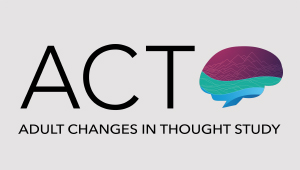
Understanding brain aging
For over 30 years, the Adult Changes in Thought (ACT) Study has been advancing our understanding of cognition, aging, and better ways to delay and prevent Alzheimer’s disease and related dementias.
New funding
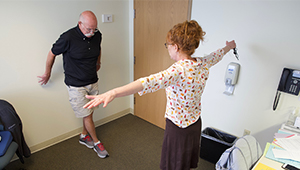
Grant of over $55M to boost Alzheimer’s, dementia study
Kaiser Permanente Washington will co-lead an expanded ACT Program to better understand the aging brain.
News
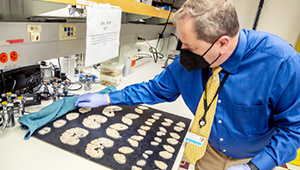
New open data to help understand Alzheimer’s
Cell by cell, scientists are building a high-resolution map of brain changes in Alzheimer’s disease.
Research
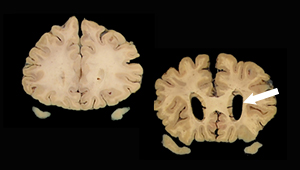
Study evaluates biomarker criteria for Alzheimer’s risk
One-third of people classified as ‘highest risk’ may not develop Alzheimer’s disease, study suggests


